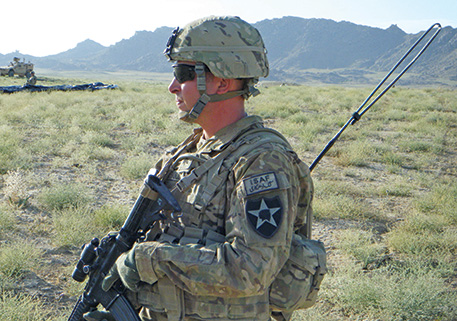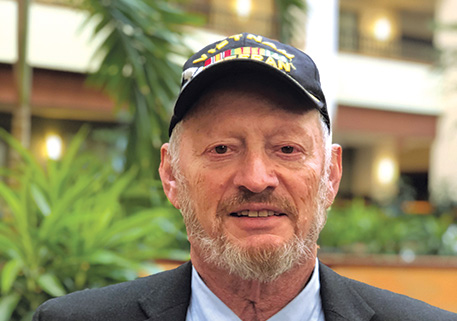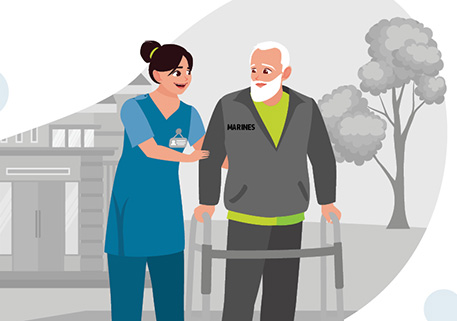Advocates converge in Washington to amplify legislative efforts
With a new president, new Congress and new VA secretary sworn into their respective offices, and with the future of veterans health care and benefits on the line, 2017 is a critical time for veterans’ voices to be heard by lawmakers. That’s why hundreds of DAV’s most dedicated advocates from across the nation converged on Washington at the end of February for the organization’s annual mid-winter conference.
At this year’s event, DAV and Auxiliary members held dozens of meetings over three days to focus on the organization’s numerous legislative priorities and advocacy efforts. Our advocates then took DAV’s message to Capitol Hill to speak directly to various members of Congress and their staffs.
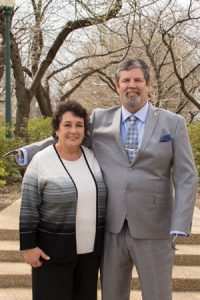
“At the very front of the line is safeguarding and improving the VA so that we can ensure all veterans, today and tomorrow, have a system accountable to them for the injuries and illnesses sustained in service to this nation,” National Commander Dave Riley told conference attendees at the opening session Feb. 26 in Arlington, Va.
“For several years, there has been a vigorous national debate about how to best provide timely, high-quality, comprehensive and veteran-focused health care to our nation’s heroes,” said Riley. “‘Choice’ should be part of the solution to fixing VA health care, but it has to fit into the big picture to ensure better health outcomes for veterans.”
National Adjutant Marc Burgess noted that the swell of interest surrounding veterans’ issues over the past three years has been remarkable.
“Frankly, it’s not something we should ignore,” he said at the opening session. “If you’ve watched the news, paid attention to the presidential election cycle, picked up a DAV Magazine or received an alert or newsletter from the national organization, you know this year we stand at a critical juncture when it comes to the future of our health care system.
“Your presence here is always one of the most important ways we can put a face on these issues and show lawmakers their actions affect real people—real veterans—and their families each day,” Burgess noted to veterans and Auxiliary members in attendance. “If there’s one thing I know about this crowd, and about the base of DAV’s membership, it’s that we stand up for the rights and benefits we’ve earned when they are threatened.
“The time for debating what’s next for VA is over. We must move from talk to action.”
VA Secretary Dr. David J. Shulkin, in his first public comments since being sworn in, addressed the conference at the opening session and laid out his top 10 priorities for the department. Among his priorities is redesigning the current Veterans Choice Program into what he called “Choice 2.0.”
With the current program set to expire in August, the secretary said he wants to eliminate rules stipulating that veterans can only utilize it if they have to wait more than 30 days for an appointment or live more than 40 miles’ driving distance from a VA facility. Shulkin noted, though, that he must first get Congress to eliminate the expiration date of the current program before he can officially propose Choice 2.0.
“We want to make sure we continue the current program so veterans don’t experience any gap in care,” said Shulkin.
Other top priorities for Shulkin include employee accountability; enhancing the VA’s information technology capabilities and improving infrastructure; and making quicker decisions on veterans’ disability claims, pension compensation and appeals.
Commander Riley later presented the secretary with DAV’s Outstanding Federal Executive of the Year award for his exemplary leadership and service to ill and injured veterans during his tenure as VA undersecretary for health.
In the lead-up to members’ Capitol Hill visits and the national commander’s testimony, DAV representatives attended a series of seminars. The first was DAV’s Benefits Protection Team legislative workshop. It focused on DAV’s 2017 legislative priorities and provided an overview of the new landscape of the executive and legislative branches of government.
“Our success in pushing for and seeing legislative changes in Washington remains dependent on the continued strength of our nationwide grassroots movement,” National Legislative Director Joy Ilem said. “Now is the time to become proactive, to prepare—before others decide it is a good idea to dismantle the VA or take away hard-earned benefits and services from those who have served and sacrificed for this country. We are all responsible to help ensure that our government upholds its promises made to our nation’s veterans and their families.”
Among the key legislative priorities that were discussed were improved benefits and services for caregivers and women veterans.
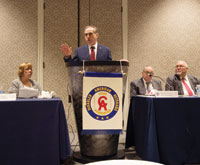

“Those are two critical issues that DAV continues to focus on,” said Ilem. “Thanks to DAV members’ continued involvement and support, the Senate is set to hold a hearing on legislation to expand caregiver support, and several bills aimed at addressing gaps in services for women veterans have been introduced in the House, based on recommendations from DAV’s special report, Women Veterans: The Long Journey Home.”
The report, released in 2014, identifies gaps in benefits and services across the federal landscape for female service members and veterans and offers 27 specific recommendations regarding health care, transition services, disability compensation, employment and housing. New legislation introduced in the Senate following the conference—the Deborah Sampson Act—also addresses key recommendations made by the report, and more than a dozen bills were introduced during the 114th Congress, one
of the most significant being the Female Veteran Suicide Prevention Act, which was signed into law by President Obama last June.
“The passage and signing of this law was a step forward in addressing the unique transition needs of women veterans,” Ilem said. “This was clearly a victory, but there’s still more work to be done.”
The conference peaked on Feb. 28 when Commander Riley testified before a special joint hearing of the Senate and House Veterans’ Affairs Committees. Veterans and supporters filled the caucus room to maximum capacity in the Dirksen Senate Office Building for the hearing.
Riley’s first order of business in his testimony was to address access to high-quality VA health care. He noted that since the 2014 waitlist scandal, a vigorous national debate has taken place about how to reform the VA and that, by the end of 2016, virtually all major stakeholders had come to a common, long-term solution of creating an integrated network of both VA and community providers to ensure veterans have seamless access whenever and wherever they need it.
Riley noted, however, that there are still some within the veteran community who are promoting an unrealistic vision of what the Choice program should ultimately be.
“Rather than continuing to debate the false promise of unlimited choice,” Riley testified, “it’s time for Congress to get behind the plan to create an integrated network that keeps VA as the coordinator and primary provider of care and uses the best of private care to fill access gaps.
“That’s real choice,” he emphasized.
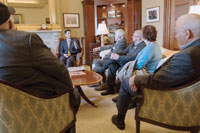

Riley spoke about a number of other issues during his testimony, including women veterans, appeals reform and the VA budget for fiscal year 2018. But the most poignant element of his testimony was the topic of family caregiver and support services.
A quadruple amputee, Riley depends on his wife of 30 years, Yvonne, for assistance in completing many of life’s everyday activities.
Riley recounted how the decisions to amputate all four of his limbs while he was in a coma fell to Yvonne. While the procedures were necessary for his survival, he told the joint committee members that her challenges had only begun during his first major hospital stay.
“She has been my source of strength and inspiration all these years, especially in my darkest moments. She has selflessly dedicated herself in unconditional love and compassion for two decades,” he said. “For Yvonne, and all other caregivers like her, we owe a tremendous debt of gratitude. She and all caregivers are truly unsung American heroes.”
Yvonne received a standing ovation from both the audience and members of the joint committee.
“Unfortunately, VA’s comprehensive caregiver assistance program is limited to those caring for veterans injured or made ill after 9/11, leaving untold thousands of family caregivers behind,” Riley explained before calling on Congress to correct the inequity by expanding the program to all caregivers of seriously disabled veterans from all eras.
“Never forget the men and women we’re fighting for,” Riley implored to convention-goers at the opening session in the days prior to his testimony. “The veterans here in this room, the veterans in long-term care and nursing facilities, the veterans coming home each and every day making the difficult transition back to civilian life and the service members currently overseas in harm’s way. Let these men and women guide your daily efforts.”
Learn more online
More on how to advocate with DAV can be found at dav.org/grassroots. Information on DAV’s efforts to reform veterans health care is available at dav.org/operation-keep-promise-2016.
Watch video online
The opening session presentations from DAV leadership and the VA secretary are available on DAV’s YouTube channel at YouTube.com/DisabledVeterans




